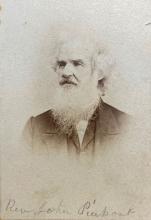The Spiritualist Reverend
Submitted by Erica Ciallela on Mon, 08/05/2024 - 1:00pmReform movements took root as the Second Great Awakening swept across the United States. From abolition and temperance to labor and women’s rights, there was a call for the nation to be remade. By the 1840s, the political landscape was shifting and innovations in science were reinvigorating American culture.




